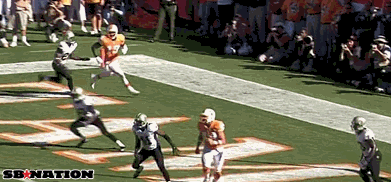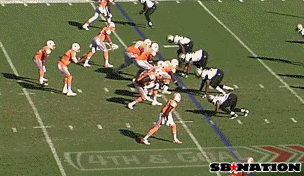/cdn.vox-cdn.com/uploads/chorus_image/image/1783561/154530643.0.jpg)
The Tampa Bay Buccaneers suffered a tough 35-28 defeat at the hands of the New Orleans Saints on Sunday, as the Bucs blew a 14-0 lead and came up just short on a furious attempt to force overtime. Tampa Bay's final drive left many fans shaking their heads and wondering what exactly had happened on a game-ending illegal touching penalty.
After forcing the Saints to punt, the Bucs were set up at their own 21-yard line with no timeouts. A 38-yard pass to Vincent Jackson got the Bucs into Saints territory, and three more passes got them to first and goal at the 9-yard line. A spike to stop the clock and two incompletions set up fourth and goal from the 9 with five seconds left. On the subsequent play, Freeman dropped back, spun out of the pocket and fired a pass to Mike Williams in the back of the end zone. The ensuing celebration was short-lived, however, as Williams was called for an illegal touching penalty.
What is an illegal touching penalty? According to Rule 8, Section 1, Article 8 of the NFL rule book:
It is a foul for illegal touching if a forward pass (legal or illegal), thrown from behind the line of scrimmage:
....
(b) first touches or is caught by an eligible receiver who has gone out of bounds, either of his own volition or by being legally forced out of bounds, and has re-established himself inbounds.
In case you missed it, here is Mike Williams getting forced out of bounds:
The first question out of most Bucs fans mouths was, "How could Patrick Robinson be allowed to shove Mike Williams out of bounds like that? Isn't that illegal contact?"
Sorry Bucs fans, Rule 12 of the NFL rule book is going to leave you disappointed. According to that rule, once the quarterback leaves the pocket area (defined in Rule 3, Section 24 as tackle to tackle), "the restrictions on the defensive team relative to offensive receivers (illegal contact, illegal cut block) will end." As this GIF shows, Josh Freeman had left the pocket:
There were proclamations that getting rid of illegal contact in this situation is unfair. However, given the fact that a scrambling quarterback can become a runner, it makes sense to let the defenders shed a blocking wide receiver if need be. Bucs fans might contend that Freeman was obviously not a runner in that situation, but that creates the need for a judgment call by the referee. This introduces unnecessary subjective judgment beyond just "Was he outside the pocket?" It was unfair to the Bucs, but I imagine they have benefited from similar rules at some point in their history.

